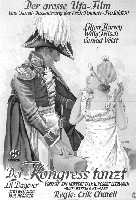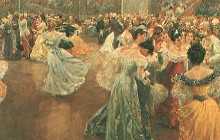 |
Vol 1, No 4, 19 July 1999
|
|
|
 S C H M A L T Z:
S C H M A L T Z:Forget the Fascism - Give us the Schmaltz! Escapist films of the 1930s by Austrian and German directors Andrew J Horton The casual film viewer with little knowledge of history could be forgiven for thinking that the 1930s were blissful years of gaiety and joy. A superficial look at the standard cinematic fare of the period in any country gives little indication that the New York Stock Exchange had only just recently crashed and the whole world descended into economic chaos as a consequence. As the Depression took its toll on the world's economies and fascism strengthened its grip on Central Europe, a number of Austrian and German directors working both at home and abroad took refuge from reality to produce what are possibly some of cinema's most vacuous masterpieces. Utilising the new technology of sound cinema, they made all-singing all-dancing films which recreated a carefree era that never was. The recent Waltz on Screen festival organised by the Austrian Cultural Institute in London to coincide with the centenary of Johann Strauss's death celebrated the works of the great escapists of this era with a carefully balanced mixture of sincerity and irony. Gold Soundzzz Sound cinema was born in the public's mind with Al Jolson's now-famous phrase "Wait a minute, wait a minute, you ain't heard nothing yet," which appeared in a Warner Brothers production The Jazz Singer (USA, 1927). The following year, the next wave of sound pictures arrived from rival studios, and by the time Wall Street had crashed, it was obvious that silent films would soon be a thing of the past. Sound freed directors in many ways, giving them new powers of expression and allowing them, as in The Jazz Singer, to use music to give their pictures popular appeal. To match the aural entertainment, visual bravura was employed as well. The MGM (Metro-Goldwyn-Mayer) production company became famous for its grand choreographed dance sequences, most famously associated with the name of Busby Berkley. Meanwhile, European studios were also exploring the new medium. Although they had lower budgets than their Hollywood counterparts, European films, particularly in the early 1930s, had freer and more spontaneous music sequences, with remarkably fluid editing and cameras gliding over the dancers, whereas MGM photography remained relatively static. And thus was born the musical. Erich Charell's Der Kongress tanzt (The Congress Dances, Germany, 1931) is an early example of this genre, although it in fact follows the example of staged operetta more than it does that of the musical. The film carried a number of important features which were distinguishing features of the musicals that were to follow it. Needless to say, the style was light and humorous and involved a romantic triangle. The wooing of its main character by a seducer who is richer and more sensuous than the hero or heroine's earthy and faithful partner was to become a well-worn cliche in these films. The eventual failure of the relationship would also become a familiar feature, although the original German version of Der Kongress tanzt (it was later remade twice for the benefit of English-speaking and French-speaking audiences) does something which would be anathema to American films and ends on a sad and melancholic note. Politics Lite More interesting perhaps is the film's attitude toward politics. Set against the backdrop of the 1815 Vienna Congress, which was staged in the wake of Napoleon's defeat in order to carve up Europe amongst the major powers, with the Machiavellian Austrian chancellor Prince Metternich and the wily and suave Czar Alexander I of Russia in the leading male roles, the film is at one level totally submersed in politics. However, this is cinema's own special brand of "Politics Lite," which would be later popularised by Hollywood. First of all, the film is set over a century in the past and presents a dilemma which had long since been resolved and had caused no worry to anyone for many years. Secondly, the political wrangles are just a screen for the romantic ones and the film is driven far more by plot requirements than by historical reality. The superficiality of politics in this highly politicised time was a feature of most of the Waltz on Screen films from this era. Whilst Der Kongress tanzt is far removed in time for its audience, The Merry Widow (USA, 1934) made by German director Ernst Lubitsch is - for the Americans it was aimed at - also far removed geographically. The film's action takes place in 1885 this time and centres on the
There is a strange contradiction between the vast sums of money spent on recreating Central Europe through sets and costumes (over USD 2,000,000 was spent, an amount that almost bankrupted MGM, especially after having paid USD 250,000 for the film rights) and the complete lack of attention to detail in the scenario and script. Aside from completely ignoring the real politics of the region, interesting gaffes include giving the land-locked country a navy. The Waltz King P>If The Merry Widow is an example of a German director creating a cosy and comforting vision of rural Central Europe for American audiences, then The Great Waltz (USA, 1938), another expensive MGM dance musical, is an example of American politics transposed into Central Europe. The film was directed by French director Julien Duvivier, but he balked at the slushy ending and resigned half-way through the shooting, leaving it to be finished by the Vienna-born Josef von Sternberg.The film is the story of waltz king himself Johann Strauss II but all pretences that the story-line bears any relationship to reality are completely abandoned, and the film openly starts with an admission that it is a biography of the spirit of Strauss and not the fact. The politics in the backdrop to this film are those of the 1848 revolution which overthrew the anti-reformist Metternich. Walking through carefully reconstructed Viennese streets adorned with signs in German, students carry English-language signs denouncing tyranny and shout out slogans demanding those mainstays of American identity - a constitution and freedom of speech. The political scenes jar with the rest of the film, which is perhaps why the revolutionaries achieve their aims in full half-way through the film, and politics vanishes completely from the plot. The subconscious message is that not only can political aspirations in the region be fulfilled, but politics itself can become irrelevant once the American ideals of government ar e transplanted into Central Europe. Spreading it on The Great Waltz, even by 1930s standards, contains a quite incredible number of cheesy one-liners, and when MGM released their publicity for the film - saying "only MGM could make such a picture" - they were probably unaware of just how true their words would turn out to be. The irony of the fact that The Great Waltz was celebrating one of Austria's finest national heroes in a year in which the country had effectively been conquered by Germany seems to have also escaped the makers of the film. This was confirmed in an interview with the film's star, two-time Oscar winner Luise Rainer, after its recent London screening. After a series of anodyne and fawning questions from film historian and interviewer David Robinson, a member of the audience asked how aware were the people in the film of events in Austria, which for many of them was once their homeland. The question had an interesting effect, and a previously garrulous Rainer was stunned into silence. She asked for the question to be repeated, then claimed she didn't understand the question and then stammered a few words about being "very involved" with Kosovo. The questioner, however, was not to be put off and persisted, and eventually Rainer plucked up the courage to admit what we suspected all along: "They all lived in cuckoo-land". Having had the courage to say this, Rainer gained momentum, saying that she di dnot think it a bad thing that these people were so immersed in their little film world that they had no connection with reality. Expanding on her arguments, she pointed out that people needed an escape from their sorrows and day-to-day miseries - and there were certainly enough of those around in the 1930s. Andrew J Horton, 19 July 1999 Waltz on Screen appeared at the Riverside Studios in Hammersmith, London, as part of the Perfect Movement festival organised by the Austrian Cultural Institute to mark the centenary of Johann Strauss's death.
|
|
![]()
Copyright (c) 1999 - Central Europe Review Internet servis, a.s.
All Rights Reserved
 imaginary Central European country of Marshovia, wedged between Hungary and Romania and heavily orientalised. Again, politics is a screen for romantic intrigues. King Achmed of Marshovia and the Marshovian ambassador to France try to force dashing bachelor Captain Danilo to marry Sonia - the country's richest woman and the merry widow of the title - before she spends half of Marshovia's wealth on fine living in Paris. In the back of Achmed's mind is the notion that the peasants will revolt and overthrow him if the widow is not brought back to spend her money in her homeland. There is of course no intimation of suffering and repression in this violent form of politics, and revolution is implied to be a comic and amusing interlude which will merely result in a change of fortunes for an overweight and buffoonish character.
imaginary Central European country of Marshovia, wedged between Hungary and Romania and heavily orientalised. Again, politics is a screen for romantic intrigues. King Achmed of Marshovia and the Marshovian ambassador to France try to force dashing bachelor Captain Danilo to marry Sonia - the country's richest woman and the merry widow of the title - before she spends half of Marshovia's wealth on fine living in Paris. In the back of Achmed's mind is the notion that the peasants will revolt and overthrow him if the widow is not brought back to spend her money in her homeland. There is of course no intimation of suffering and repression in this violent form of politics, and revolution is implied to be a comic and amusing interlude which will merely result in a change of fortunes for an overweight and buffoonish character.